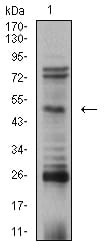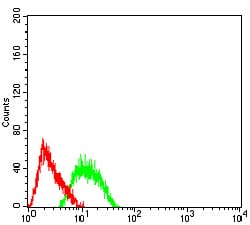


| WB | 1/500 - 1/2000 | Human,Mouse,Rat |
| IF | 咨询技术 | Human,Mouse,Rat |
| IHC | 咨询技术 | Human,Mouse,Rat |
| ICC | 技术咨询 | Human,Mouse,Rat |
| FCM | 1/200 - 1/400 | Human,Mouse,Rat |
| Elisa | 1/10000 | Human,Mouse,Rat |
| Aliases | PDA2; AP-2B; AP2-B |
| Entrez GeneID | 7021 |
| clone | 6F7G1 |
| WB Predicted band size | 50.5kDa |
| Host/Isotype | Mouse IgG2b |
| Antibody Type | Primary antibody |
| Storage | Store at 4°C short term. Aliquot and store at -20°C long term. Avoid freeze/thaw cycles. |
| Species Reactivity | Human |
| Immunogen | Purified recombinant fragment of human TFAP2B (AA: 84-193) expressed in E. Coli. |
| Formulation | Purified antibody in PBS with 0.05% sodium azide |
+ +
以下是关于TFAP2B抗体的3篇参考文献及其摘要概括:
1. **文献名称**:*TFAP2B in Adipocyte Development and Function*
**作者**:Schmidt M, et al.
**摘要**:该研究探讨了TFAP2B在脂肪细胞分化和代谢调控中的作用,利用特异性抗体通过免疫组化和Western blot验证其在脂肪组织中的表达模式,表明其与肥胖相关基因的调控有关。
2. **文献名称**:*Role of TFAP2B in Neural Crest Cell Migration and Char Syndrome Pathogenesis*
**作者**:Li Y, et al.
**摘要**:研究通过免疫荧光和染色质免疫沉淀(ChIP)技术,结合TFAP2B抗体,揭示了该转录因子在胚胎神经嵴细胞迁移中的功能异常如何导致Char综合征的先天性心脏缺陷。
3. **文献名称**:*TFAP2B as a Biomarker in Triple-Negative Breast Cancer*
**作者**:Gupta R, et al.
**摘要**:文章分析了TFAP2B在乳腺癌中的表达,使用特异性抗体进行免疫组织化学检测,发现其高表达与三阴性乳腺癌的侵袭性相关,提示其潜在临床预后价值。
这些文献涵盖了TFAP2B在发育生物学、疾病机制及癌症研究中的应用,均涉及抗体实验方法。如需具体文献来源,建议通过PubMed或Google Scholar搜索标题获取全文。
The TFAP2B antibody targets the Transcription Factor AP-2 Beta (TFAP2B), a member of the AP-2 family of DNA-binding proteins critical in regulating gene expression during embryonic development and cell differentiation. TFAP2B plays a key role in neural crest cell development, craniofacial morphogenesis, and the differentiation of tissues such as kidneys, skin, and adipose. It binds to specific DNA sequences to activate or repress target genes involved in cell proliferation, apoptosis, and tissue-specific functions. Mutations in TFAP2B are linked to Char syndrome, a rare genetic disorder characterized by patent ductus arteriosus, facial dysmorphism, and hand anomalies, highlighting its importance in developmental pathways.
Antibodies against TFAP2B are widely used in research to study its expression, localization, and functional roles in both normal and pathological contexts. They enable detection via techniques like Western blotting, immunohistochemistry (IHC), and immunofluorescence (IF), aiding investigations into diseases such as obesity, cancer (e.g., neuroblastoma, breast cancer), and congenital disorders. Commercial TFAP2B antibodies are typically validated for specificity using knockout controls or siRNA-mediated silencing. Researchers also utilize these antibodies to explore TFAP2B's interactions with co-regulators or its role in signaling pathways, contributing to therapeutic target discovery and mechanistic studies in developmental biology and oncology.
×